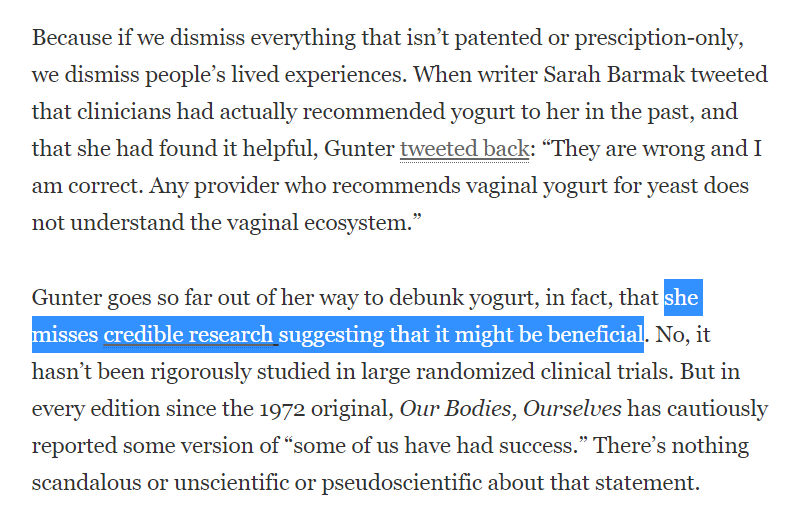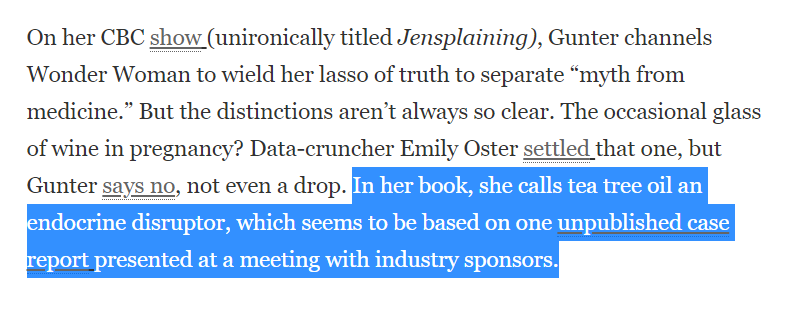Many of you have probably seen the below. Feels weirdly harsh, gratuitous, odd. It& #39;s not really @sciam language - although after they published that yard and a half of bullshit about 5G a while back, maybe that& #39;s changed.
Anyway. I& #39;m not happy with it. https://blogs.scientificamerican.com/observations/doctors-are-not-gods/">https://blogs.scientificamerican.com/observati...
Anyway. I& #39;m not happy with it. https://blogs.scientificamerican.com/observations/doctors-are-not-gods/">https://blogs.scientificamerican.com/observati...
Factually, this piece contains (at least) two screwups for the business of ... let& #39;s say & #39;asserting evidence-based authority& #39;.
If you want to wear the big I Have The Best Evidence hat, you better bring your A-game.
If you want to wear the big I Have The Best Evidence hat, you better bring your A-game.
Considering what I do for work, the phrase & #39;credible research& #39; jumped out at me. As might be expected.
So what& #39;s that study?
It& #39;s ... not good.
So what& #39;s that study?
It& #39;s ... not good.
The authors, to their credit, appear to be trying. But the study is a bin fire. Magic power analysis, small samples, large amounts of multiple comparisons, some really oddly reported statistics. I can& #39;t re-create bits of it because the tests aren& #39;t reported legibly.
And I& #39;m FAIRLY sure the right hand side columns of Tables 2 and 3 shouldn& #39;t have identical p-values if the numbers change their proportions. Depends on test (not clearly reported). Don& #39;t have wherewithal to chase it all down, I& #39;m not @sTeamTraen and I am a leeeeetle bit hungover.
Additional: the journal isn& #39;t great. I don& #39;t know if it& #39;s "predatory" per se, but I& #39;d definitely go as far as & #39;low quality& #39;. Apparently the parent organisation threatened to sue Beall when he put them on his blacklist. Have a look at a few of the other studies. You& #39;ll see.
(And you& #39;d think that a journal where you pay an APC would shell out for a bit of copyediting, wouldn& #39;t you?? Whoever made this PDF is an arseclown. Note: that& #39;s on the journal, NOT the authors.)
But look, that& #39;s just one citation. Are there other similar studies out there - treating thrush with natural remedies? Yes. And the first one I clicked on was *worse*. Peep the statistics on this bad boy. https://www.ncbi.nlm.nih.gov/pmc/articles/PMC6049967/">https://www.ncbi.nlm.nih.gov/pmc/artic...
Now this is a bit more interesting, because there& #39;s lots of fuss about xenoestrogens in the last few years, with the usual caveats - lots of bioactive molecules, lots of formulations, lots of animal studies, lots of potential damage, lots of endocrinology (ie. annoying).
This unpublished case study, uh, got published.
https://www.ncbi.nlm.nih.gov/pubmed/31393563
Tea">https://www.ncbi.nlm.nih.gov/pubmed/31... tree oil fuss started years ago.
https://www.ncbi.nlm.nih.gov/pubmed/17267908
Also">https://www.ncbi.nlm.nih.gov/pubmed/17... & #39;a meeting with industry sponsors& #39; in endocrinology is... probably all of them. The research was funded by NIEHS.
https://www.ncbi.nlm.nih.gov/pubmed/31393563
Tea">https://www.ncbi.nlm.nih.gov/pubmed/31... tree oil fuss started years ago.
https://www.ncbi.nlm.nih.gov/pubmed/17267908
Also">https://www.ncbi.nlm.nih.gov/pubmed/17... & #39;a meeting with industry sponsors& #39; in endocrinology is... probably all of them. The research was funded by NIEHS.

 Read on Twitter
Read on Twitter



